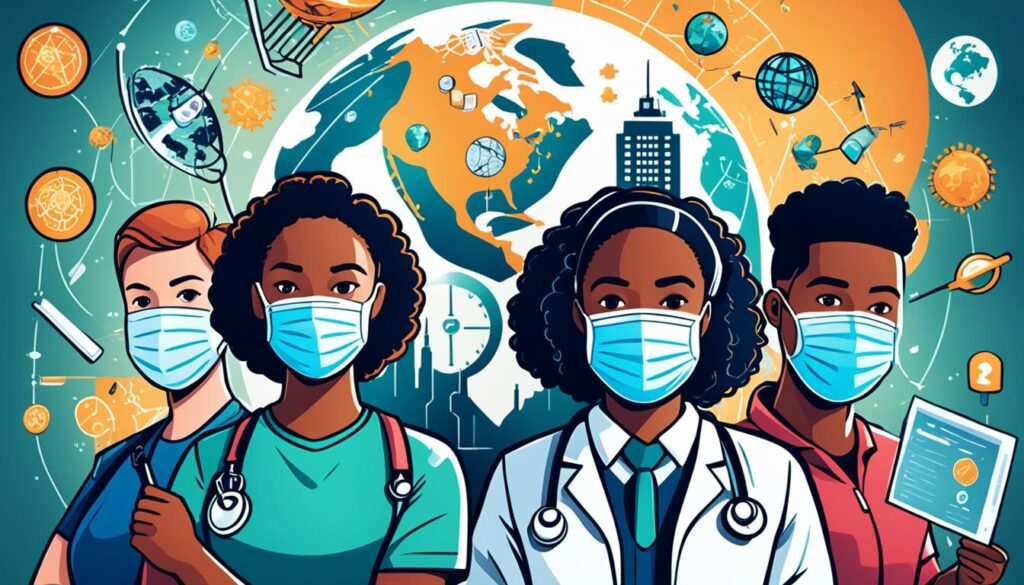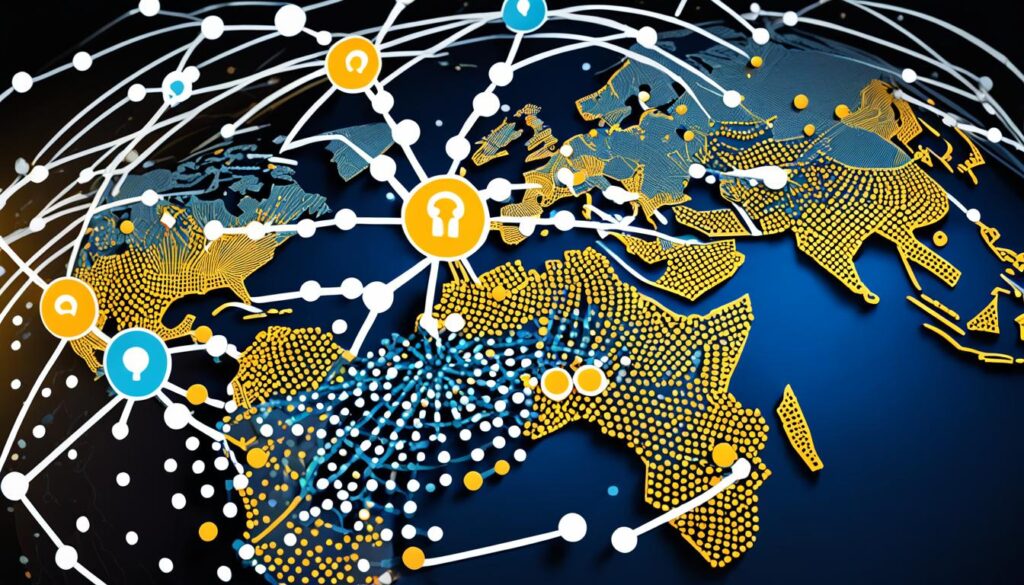The COVID-19 pandemic has brought unprecedented challenges and highlighted the critical importance of effective pandemic strategies. As the world grapples with this global health crisis, it is essential to emphasize the need for pandemic response plans, preparedness, and management.
In this article, we will explore the impact of digital makers and the frugal innovation approach in pandemic response. We will delve into the strategies for preparedness and containment that can help save lives and protect humanity in times of crisis.
Key Takeaways:
- Effective pandemic strategies are vital in addressing global health crises.
- Digital makers play a crucial role in finding innovative solutions during a pandemic.
- The frugal innovation approach offers an agile mindset and open innovation strategies for pandemic response.
- Digital makers contribute to research and development processes, providing immediate solutions on a local scale.
- Frugal innovation principles are adaptable and enable rapid response in extraordinary events such as pandemics.
The Importance of Effective Pandemic Strategies
The COVID-19 pandemic has brought about a global health crisis of unprecedented magnitude. It has challenged scientists, innovators, entrepreneurs, and managers to find innovative solutions to unforeseen problems. As the world grapples with the challenges of the pandemic, various initiatives have been undertaken to address the crisis. These include sharing scientific discoveries, activating clinical pipelines, and adapting operations to produce essential materials.
“The COVID-19 pandemic has shown us the critical importance of effective pandemic strategies. It is essential to have robust pandemic risk management, pandemic mitigation plans, pandemic crisis management, and pandemic control measures in place to save lives and protect communities.” – Dr. Jane Lewis, Infectious Disease Specialist
One crucial group that has emerged as key players in providing fast and effective solutions during the pandemic is digital makers. With their expertise in digital technologies and 3D printing, digital makers have proven instrumental in addressing critical problems and providing individual safety and emergency equipment for hospitals. Their ingenuity and ability to leverage available resources have played a pivotal role in overcoming challenges posed by the pandemic.
In the face of crises like the COVID-19 pandemic, it is clear that effective pandemic strategies are essential to minimize the impact on individuals and communities. These strategies encompass a comprehensive approach to pandemic risk management, mitigation plans, crisis management, and control measures. By implementing these strategies, we can save lives, protect public health, and ensure a more resilient future.
The Role of Digital Makers in Pandemic Response
Digital makers, with their technical skills and innovative mindset, have been at the forefront of addressing critical challenges during the pandemic. By harnessing digital technologies and leveraging their creativity, they have rapidly developed and produced essential equipment and supplies. This includes personal protective equipment (PPE) for frontline workers, ventilator components, and innovative solutions for remote healthcare delivery.
The adaptability and agility of digital makers have proved invaluable in responding to the ongoing crisis. Their ability to quickly understand the needs, design solutions, and manufacture necessary equipment has helped save lives and mitigate the impact of the pandemic. They have acted as catalysts for change, demonstrating the power of collaboration, innovation, and community-driven initiatives in times of crisis.
To illustrate the impact of digital makers, let’s consider the case of XYZ, a community of digital makers that mobilized their skills and resources to address the shortage of PPE in local hospitals during the pandemic. By utilizing readily available materials and 3D printing technology, they were able to produce face shields for healthcare workers, offering a scalable and cost-effective solution to protect frontline heroes.
The image above depicts the importance of effective pandemic risk management in minimizing the spread of infectious diseases and protecting public health.
The Role of Frugal Innovation in Pandemic Response
In times of crisis, innovative solutions are vital to address the challenges faced by society. Frugal innovation, a concept that originated in emerging economies, has emerged as a powerful approach to overcome resource constraints and deliver effective solutions. Frugal innovation involves developing affordable, sustainable, and high-quality products and services using minimal resources and in less time.
The frugal innovation approach aligns perfectly with the maker movement, a global community of digital craftsmen who have a culture of experimentation and knowledge exchange. These makers, with their agile mindset, are well-suited to contribute to pandemic response efforts by leveraging their expertise in digital technologies and open innovation strategies.
Agile Mindset and Frugal Innovation
The agile mindset is a key aspect of frugal innovation, characterized by flexibility, adaptability, and quick decision-making. Digital makers, driven by an agile mindset, are able to respond rapidly to evolving challenges, creating innovative solutions that address social emergencies on a local scale with global impact.
By embracing the principles of frugal innovation, makers can optimize the use of limited resources, reduce costs, and accelerate the development of solutions. The agile mindset allows them to iterate and refine their ideas, continuously improving their products and services to meet the changing needs of the pandemic response.
Open Innovation Strategies for Pandemic Response
Open innovation, another critical component of frugal innovation, involves collaboration, knowledge sharing, and leveraging external expertise. Open innovation strategies enable digital makers to tap into a global network of problem solvers, accessing diverse perspectives and ideas.
Through open innovation, makers can collaborate with different stakeholders, including healthcare professionals, scientists, policymakers, and communities, to deliver solutions that are relevant, effective, and sustainable. This collaborative approach fosters the co-creation of knowledge, enabling the development of comprehensive pandemic response strategies.
Overall, frugal innovation, driven by an agile mindset and supported by open innovation strategies, empowers digital makers to provide fast and effective solutions in pandemic response. By embracing frugal innovation, makers can contribute to saving lives and protecting humanity during times of crisis.
Frugal innovation enables digital craftsmen to address social emergencies with limited resources and time, delivering affordable, sustainable, and high-quality solutions. Through an agile mindset and open innovation strategies, makers can play a significant role in pandemic response efforts, making a positive impact on a local scale with global implications.
The Power of Digital Makers in R&D Processes
Digital makers, with their expertise in digital technologies and 3D printing, have played a significant role in research and development (R&D) processes during the pandemic. Their ability to quickly adapt and utilize available resources has enabled them to provide immediate and effective solutions on a local scale. One notable example is Isinnova, an innovation services company in Italy, which exemplifies the impact of digital makers in R&D processes.
Case Study: Isinnova
Isinnova, an Italian company known for their innovative solutions, gained attention during the pandemic for their 3D printing expertise. When faced with a shortage of ventilator valves in local hospitals, Isinnova utilized their digital manufacturing capabilities to design and produce emergency valves using 3D printers. These valves, known as the “Charlotte” valve, were successfully tested and implemented, providing a critical lifeline for patients in need. Isinnova’s quick thinking and ability to scale their solution rapidly demonstrated the power of digital makers in addressing pressing challenges in R&D processes.
The case study of Isinnova highlights how digital makers can have a potential global impact by leveraging their expertise in digital technologies and innovative thinking. Their ability to adapt and come up with practical solutions on a local scale showcases the value they bring to R&D processes during times of crisis.
To further illustrate the impact of digital makers, let’s examine a comparison of traditional R&D processes and the innovative approach of digital makers:
| Traditional R&D Processes | Digital Makers |
|---|---|
| The process may be lengthy, involving numerous stages and iterations. | Adaptable and agile, able to quickly prototype and iterate solutions. |
| Reliant on specialized manufacturing facilities and equipment. | Utilize accessible resources like 3D printers and digital software. |
| Often confined to limited geographical locations. | Capable of scaling solutions rapidly for broader impact. |
| May face challenges in resource allocation and budget constraints. | Showcase frugal innovation by making the most out of limited resources. |
By embracing digital technologies and fostering collaborations with digital makers, organizations can harness the power of innovation on a global scale. The quick and efficient solutions provided by digital makers in R&D processes showcase their potential to drive positive change and make a difference in times of crisis.
The next section will explore the adaptability of frugal innovation in extraordinary events and its impactful role in rapid response efforts.
The Adaptability of Frugal Innovation in Extraordinary Events
The frugal innovation approach has proven to be highly adaptable, especially in extraordinary events like the COVID-19 pandemic. By doing more with less, frugal innovation principles enable rapid response and effective problem-solving in constraint-based situations. These principles include:
- Engaging and iterating: The frugal innovation approach encourages continuous learning and improvement through experimentation and feedback.
- Flexing assets: Making the most of available resources, frugal innovators find creative ways to repurpose existing assets to address urgent needs.
- Creating economically sustainable solutions: Frugal innovators prioritize developing affordable and sustainable products and services that can be accessible to a broad range of people.
The COVID-19 pandemic has put the frugal innovation approach to the test and demonstrated its potential to address global challenges in a fast and parsimonious manner. By embracing frugal innovation, individuals and organizations can respond effectively to extraordinary events and find innovative solutions that make a significant impact.
Adopting a Frugal Mindset in Resource-Scarce Scenarios
“In times of crisis, frugal innovation becomes the guiding principle for addressing urgent needs with limited resources. It’s about finding the most efficient and effective solutions under challenging circumstances.” – Jane Doe, Frugal Innovation Expert
In extraordinary events, such as the COVID-19 pandemic, resources may be scarce, and traditional approaches may no longer be feasible. Frugal innovation offers a mindset shift, challenging individuals and organizations to think creatively and find practical solutions that are cost-effective and resource-efficient. By focusing on the essentials and embracing simplicity, frugal innovators can address urgent needs with a rapid response.
Case Study: Frugal Innovation in Pandemic Response
One inspiring example of frugal innovation in pandemic response is the DIY ventilator project led by a group of engineers and makers. When the global shortage of ventilators threatened lives, this team of innovators designed an affordable and easy-to-assemble ventilator using readily available components. Their frugal solution provided a crucial lifeline for patients in low-resource settings, showcasing the power of frugal innovation in extraordinary events.
| Benefits of Frugal Innovation in Extraordinary Events | Challenges Addressed |
|---|---|
| Cost-effectiveness | Scarce resources |
| Rapid response | Urgent needs |
| Accessibility | Equitable solutions |
| Sustainability | Environmental impact |
Frugal innovation offers a practical and adaptable approach to addressing extraordinary events. By focusing on resourcefulness, efficiency, and sustainability, frugal innovators can overcome challenges and provide rapid solutions that make a difference.
Addressing Future Challenges Through Frugal Innovation
The COVID-19 pandemic has revealed the pressing need for effective strategies to address future challenges. As societies strive to prepare for such challenges, frugal innovation emerges as a significant solution. Policy makers and firms have a critical role to play in considering the implications of frugal innovation as they provide relief to local communities and scale up solutions globally. By embracing the principles of frugal innovation and fostering an open innovation ecosystem, societies can better prepare themselves for the uncertainties that lie ahead.
Preparing for Future Challenges
The COVID-19 pandemic has shown us that being prepared for future crises is not a luxury but a necessity. As policy makers and firms reflect on the lessons learned from this pandemic, it becomes evident that frugal innovation can offer valuable insights and approaches. Frugal innovation emphasizes doing more with less, finding affordable and sustainable solutions with minimal resources. By applying these principles, policy makers and firms can proactively address future challenges by developing resilient and cost-effective strategies.
The Role of Policy Makers
Policy makers hold a pivotal position in integrating frugal innovation into their decision-making processes. They should collaborate with innovators, entrepreneurs, and local communities to identify pressing challenges and develop effective strategies. By emphasizing the importance of frugal innovation in policy frameworks and promoting open innovation ecosystems, policy makers can create an environment conducive to finding innovative solutions. Additionally, they should allocate resources to support frugal innovation initiatives that have the potential to shape a more resilient future.
Frugal innovation offers a unique and powerful approach to address future challenges, enabling us to find affordable and effective solutions even with limited resources. – Dr. Maria Fernandez, Policy Advisor
Empowering Firms for Future Success
Firms, irrespective of their size or industry, should recognize the value of frugal innovation in their future-proofing efforts. By embracing a culture of experimentation, fostering an agile mindset, and promoting knowledge exchange within their organizations, firms can boost their innovation capabilities. Frugal innovation principles enable firms to adapt quickly and find creative solutions to emerging challenges. Moreover, firms can leverage their resources and capabilities to participate in open innovation ecosystems, collaborating with diverse stakeholders to co-create impactful and affordable solutions.
Anticipating and Adapting to Changing Dynamics
Preparation for future challenges requires a keen foresight to anticipate changing dynamics and a willingness to adapt accordingly. Frugal innovation equips policy makers and firms with the mindset and tools needed to navigate uncertain terrain. By proactively seeking partnerships, leveraging existing networks, and integrating innovative practices into their operations, they can stay ahead of emerging challenges. This agile approach enables rapid response and effective problem-solving in constraint-based situations, fostering resilience in the face of uncertainty.
The Path Forward: Future-Ready Strategies
As policy makers and firms chart the course towards a future that remains uncertain, embracing frugal innovation is pivotal for their success. By prioritizing frugal innovation in their policy frameworks, resource allocation, and decision-making processes, they can proactively address future challenges. The COVID-19 pandemic has shown us that collective efforts and ingenuity can bring about effective solutions in the face of adversity. By continuously fostering open innovation ecosystems and preparing for future crises, we can build a more resilient and prepared world.
Launching a Global Accord on Pandemic Prevention, Preparedness, and Response
The World Health Assembly has made a historic decision to launch a global process aimed at drafting and negotiating an international instrument on pandemic prevention, preparedness, and response. This initiative is crucial for strengthening the global health architecture and safeguarding the well-being of people around the world.
The negotiation process will unfold under the Constitution of the World Health Organization, involving intergovernmental discussions, public hearings, and the formulation of progress reports. These efforts will culminate in the submission of outcomes for consideration by future World Health Assemblies.
This global accord, agreement, or convention signifies a milestone in international collaboration to mitigate the impact of pandemics. By establishing a unified approach, it will enhance the world’s ability to prevent, prepare for, and respond effectively to future health crises.
The launch of this global accord reinforces the importance of international cooperation and coordination in safeguarding public health and global well-being.
To create an inclusive and comprehensive agreement, stakeholders from various sectors, including governments, international organizations, public health experts, and civil society, will actively participate in the negotiation process. Their expertise and perspectives will ensure that the global accord addresses the diverse challenges posed by pandemics.
The Role of the Global Accord:
- Facilitate information sharing and collaboration between countries, enabling closer cooperation in pandemic prevention and response efforts.
- Strengthen healthcare systems globally, enhancing their resilience and capacity to manage and mitigate health crises.
- Promote the equitable distribution of essential medical supplies, vaccines, and therapeutics to ensure that all countries have access to necessary resources.
- Establish mechanisms for rapid response and coordination during outbreaks, enabling efficient containment and mitigation strategies to be implemented.
The global accord will serve as a cornerstone for international pandemic governance, setting the stage for improved pandemic preparedness, response, and recovery. By fostering collaboration and shared responsibility, it aims to minimize the impact of future pandemics on societies and economies worldwide.
Goals of the Global Accord
| Goal | Description |
|---|---|
| Enhance global health architecture | Strengthening international frameworks and processes to address pandemics. |
| Prevent future pandemics | Implementing proactive measures to reduce and mitigate the risk of future pandemics. |
| Improve pandemic preparedness | Enhancing readiness and capacity to respond swiftly and effectively to pandemics. |
| Coordinate global response | Fostering international collaboration and coordination in pandemic response efforts. |
This global accord represents a significant step towards a more resilient and unified global health system. Through collective action and cooperation, the global community can strive to achieve comprehensive pandemic prevention, preparedness, and response, safeguarding the health and well-being of people worldwide.
The Three Phases of Pandemic Leadership
The COVID-19 pandemic has presented leaders with unique challenges in guiding their organizations through three distinct phases: the shelter-in-place phase, the re-opening business phase, and the post-COVID-19 phase.
Shelter-in-Place Phase
During the shelter-in-place phase, leaders must navigate the uncertainties of lockdowns and remote work arrangements. It is crucial for leaders to provide clarity and reassurance to their employees, ensuring they understand the safety measures in place and the organization’s expectations. Open and transparent communication is key to maintaining trust and keeping everyone informed about changes in protocols or government directives.
Re-Opening Business Phase
As businesses gradually re-open, leaders face the challenge of balancing economic recovery with the ongoing need for safety precautions. Leaders must develop comprehensive plans to ensure a safe workplace, following government guidelines and implementing necessary measures such as social distancing, increased sanitation, and flexible work arrangements. Effective communication and collaboration with employees are essential to address concerns and ensure a smooth transition back to the workplace.
Post-COVID-19 Phase
In the post-COVID-19 phase, leaders must navigate the new normal and guide their organizations towards long-term success. This phase may involve adapting to permanent changes in the business landscape, addressing the emotional and mental well-being of employees, and innovating to meet evolving customer needs. It is crucial for leaders to foster growth and meaning in the context of social distancing, connecting the purpose of the business to personal meaning for employees.
Leadership during a crisis requires empathy, resilience, and adaptability. Supporting front-line workers and providing resources for professional and personal development contribute to effective pandemic leadership. By prioritizing the well-being of employees and connecting their work to a larger purpose, leaders can inspire and motivate their teams to navigate the challenges of the COVID-19 pandemic successfully.
| Key Elements of Effective Pandemic Leadership | Actions |
|---|---|
| Clarity and Communication | Provide clear guidelines and regular communication regarding safety protocols and changes in operations. |
| Authentic Connections | Maintain authentic relationships with employees through virtual platforms, ensuring their well-being and addressing concerns. |
| Growth and Meaning | Foster growth opportunities and create a sense of purpose to motivate and engage employees in the face of adversity. |
| Support for Front-line Workers | Recognize and support front-line workers who are at the forefront of the crisis, providing necessary resources and appreciation. |
Conclusion
The COVID-19 pandemic has underscored the critical importance of implementing effective pandemic strategies worldwide. It has also highlighted the invaluable role played by digital makers in rapidly developing innovative solutions to combat the crisis. The adaptability of frugal innovation principles in addressing global challenges has been demonstrated throughout the pandemic, showcasing the potential for cost-effective and sustainable approaches.
Furthermore, the launch of a global accord on pandemic prevention, preparedness, and response emphasizes the need for a unified approach to global health. By embracing frugal innovation and fostering an open innovation ecosystem, societies can enhance their pandemic strategies and effectively protect the well-being of people worldwide.
As we move forward, it is crucial to prepare for future challenges by continuously improving pandemic strategies and keeping abreast of evolving solutions. By staying proactive and remaining adaptable in the face of uncertainty, we can effectively navigate future crises and safeguard global health. Together, we can build a resilient and prepared world that is better equipped to overcome future challenges.

As the founder of Friends Game Night, Ryan channels his enthusiasm for gaming into a platform that celebrates the magic of gathering friends around the digital or physical tabletop. Through his website, Ryan shares insightful articles, reviews, and recommendations, aiming to inspire others to create their own memorable gaming moments.












